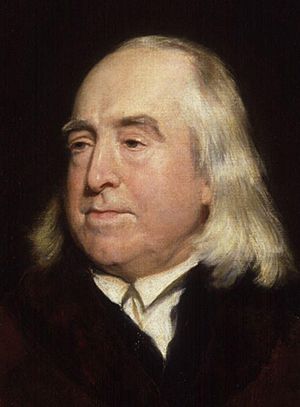Utilitarianism facts for kids

Utilitarianism is a big idea in philosophy that helps us think about what actions are right or wrong. It's all about making the world a better place! This idea says that the best action is the one that creates the most happiness for the largest number of people.
This isn't just about your own happiness. It's about everyone involved, including people in the future. Utilitarianism looks at the "utility" of an action, which means how useful it is in bringing about good results.
This way of thinking became very popular thanks to 18th and 19th century British philosophers like Jeremy Bentham and John Stuart Mill. However, similar ideas have been around since ancient times.
Bentham often talked about "the greatest good for the greatest number." But it was John Stuart Mill, who followed Bentham's ideas, who actually gave this theory the name Utilitarianism.
Contents
What is Utilitarianism?
Utilitarianism is a way to figure out if something is good or bad. It suggests that the best choice is always the one that leads to the most happiness and the least sadness for everyone affected. Think of it like a math problem where you're trying to get the highest score for overall happiness.
How Does It Work?
When you're trying to decide what to do, a utilitarian would ask:
- What are all the possible actions I could take?
- For each action, who will be affected?
- How much happiness or sadness will each person experience because of this action?
After thinking about all these things, the action that creates the most total happiness (or "utility") is considered the right one.
Focus on Consequences
Utilitarianism is a type of consequentialism. This means it judges actions based on their results or consequences, not on the intentions behind them. If an action leads to a lot of good, it's seen as a good action, even if the person doing it didn't have the best intentions.
Key Thinkers of Utilitarianism
While the basic idea of doing good for many people has been around for a long time, a few thinkers really shaped modern utilitarianism.
Jeremy Bentham
Jeremy Bentham (1748–1832) was a British philosopher and social reformer. He believed that all human actions are driven by the desire for pleasure and the avoidance of pain. He thought that society should aim to create the "greatest happiness for the greatest number."
Bentham even tried to create a "hedonic calculus" (a fancy way of saying a happiness calculator). This was a system to measure how much pleasure or pain an action would cause. He looked at things like:
- How intense the pleasure or pain would be.
- How long it would last.
- How likely it was to happen.
- How many other pleasures or pains it might lead to.
John Stuart Mill
John Stuart Mill (1806–1873) was another very important British philosopher. He was taught by Bentham and his own father. Mill agreed with Bentham's main idea but added some important changes.
Mill argued that not all pleasures are equal. He believed there are "higher" pleasures (like reading a good book, learning, or enjoying art) and "lower" pleasures (like eating or sleeping). He thought that higher pleasures were more valuable and contributed more to overall happiness. He famously said, "It is better to be a human being dissatisfied than a pig satisfied; better to be Socrates dissatisfied than a fool satisfied."
Mill also wrote about the importance of individual freedom. He believed that protecting individual rights and freedoms would ultimately lead to the greatest happiness for society as a whole.
Types of Utilitarianism
Over time, people have developed different ways to think about utilitarianism.
Act Utilitarianism
Act utilitarianism says that in every single situation, you should choose the action that will create the most happiness. You look at each specific choice and its immediate consequences.
For example, if you see a friend struggling with homework, an act utilitarian would think about whether helping them right now would create more happiness than doing something else.
Rule Utilitarianism
Rule utilitarianism is a bit different. Instead of looking at each individual action, it focuses on rules. It asks: "What general rule, if followed by everyone, would lead to the greatest happiness?"
For example, a rule utilitarian might say that the rule "always tell the truth" generally leads to more happiness in society than "sometimes lie." So, even if telling a small lie in one situation might seem to create more happiness, the rule utilitarian would still say to tell the truth because the general rule is better for everyone.
Criticisms of Utilitarianism
While utilitarianism is a powerful idea, it also has some challenges.
Difficulty in Measuring Happiness
One big problem is how to actually measure happiness or "utility." It's hard to compare one person's happiness to another's. How do you know if helping one person a lot makes up for making another person a little bit unhappy?
Justice and Rights
Sometimes, doing what creates the "greatest happiness for the greatest number" might seem unfair to a small group of people. For example, if sacrificing one person could save five, a strict utilitarian might say that's the right thing to do. But many people feel that everyone has basic rights that shouldn't be violated, even for the greater good.
Predicting the Future
Utilitarianism relies on predicting the consequences of actions. But it's often very hard to know exactly what will happen in the future. An action that seems good at first might have bad long-term effects that were not expected.
Utilitarianism Today
Even with its challenges, utilitarianism remains a very important idea in ethics. It helps us think about public policy, laws, and even everyday decisions. Many people use its principles to guide their choices, aiming to make the world a happier place for as many people as possible.
Images for kids
See also
 In Spanish: Utilitarismo para niños
In Spanish: Utilitarismo para niños
 | William L. Dawson |
 | W. E. B. Du Bois |
 | Harry Belafonte |


